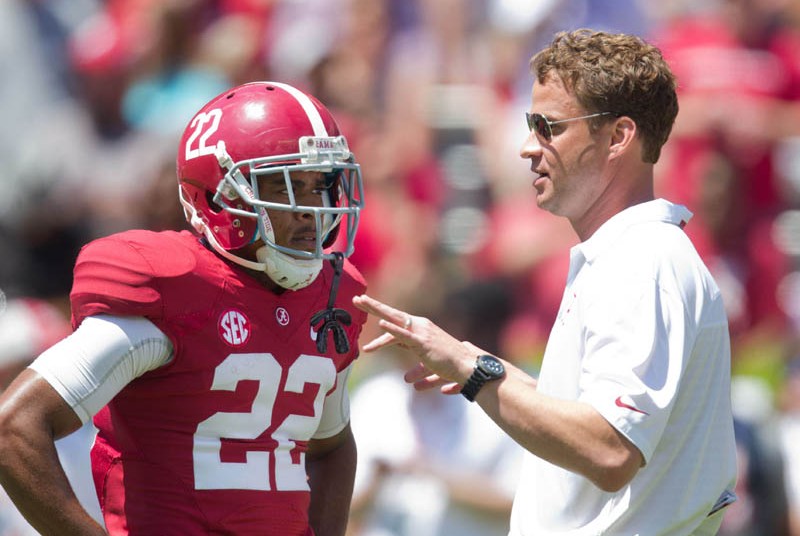Saban won't be looking to interfere with Kiffin's play-calling
TUSCALOOSA, Ala. _ While numerous University of Alabama players are set to make their collegiate debuts, and many others will be playing in their home state when the Crimson Tide opens the season against West Virginia in the Georgia Dome, Saturday will also be the Lane Kiffin’s inaugural game as UA’s offensive coordinator and play-caller.
While it will be Kiffin’s first time in that role since 2006, Saban doesn’t plan on treating him any differently from his other assistant coaches. For him that means monitoring from the sideline and making some decisions when necessary, but generally letting his coordinator call the game.
“You have to let the guy have the rhythm of what he’s trying to do,” said Saban, who usually throws in his two cents between possessions.
“Maybe say, look, ‘They’re doing a lot of this, we thought they did that, we can do this, let’s make sure we get back to that,’ more of that type thing than while we’re going on a series say do this or do that. Or I might say, ‘The next time we get the ball in a good field position let’s take a shot on these guys. They’re really playing us close outside.’”
Like most other teams Alabama puts together a script of plays it wants to run in all situations, which is the culmination of hours of film study, practices and trying to play to its strengths. Essentially all of the coaches are involved in that process.
So when the game starts it basically comes down to trust.
“That’s been the most effective way for me through the years as a head coach because I think you can really mess a guy up if you’re always questioning what he does,” Saban said. “’Why did we call that?’ Or ‘You sure that’s what we want to do on third down?’ Then the guy’s like …
“It’s just like players. I get on those corners when they get the ball thrown over their head in practice, but I’m over there rubbing their neck in the game so they don’t throw it over their head again. When the game comes, man, you’ve got to go with what you’ve got and try to get them to do it the best they can. I think it’s the same thing with the play-callers. Signal-callers have to be confident.”
Saban likes to essentially split his coaching staff between the field and the press box during games, with he and defensive coordinator Kirby Smart managing the sideline and the offensive coordinator upstairs to get a more comprehensive look of the field.
However, Saban did add that the staff made some systematic changes during the offseason to help the offense disguise plays. The idea is by changing the pre-snap presentation it can be less predictable while the defense has to key on more things to defend.
“Sort of put a little asterisk by that, but it’s got to fit in with what the players can do,” Saban said. “Especially with new quarterbacks, we don’t want to overload what they have to do in terms of their ability to execute, especially right now at this point of the season.”
A starter has yet to emerge from the competition between senior Blake Sims and junior Jacob Coker, but both quarterbacks are expected to play against the Mountaineers.
Regardless, the players said that Kiffin’s simplified calls were easier to pick up during the spring and training camp, and they’re eager to finally execute the offense against an opposing team.
“I have a good feeling how he calls the game,” junior wide receiver Amari Cooper said about Kiffin, the former USC, Tennessee and Oakland Raiders head coach. “He takes advantage of certain situations and certain match-ups really well.”
STORY UPDATE: During his press conference Wednesday evening Saban said he’ll be going against his usual policy and have Kiffin on the sideline.
“We’re going to put him on the field,” Saban said. “I always let the coordinators be where they want to be, but in this case, even though he felt more comfortable being in the press box, I think it’s important that he is on the field, he has the greatest impact and effect on the players.”
Saban told the story again about when he was a coordinator he always wanted to go in the press box because he could lay out all the plays in front of him.
“But you have no impact on the players and you can’t make adjustments during the game as easily up there because you can’t communicate. So when I went to work for (Bill) Belichick in Cleveland as a defensive coordinator he said ‘You’re not going to be in the press box, you’re going to be on the field. I said ‘I can’t call all this stuff, we have 52 different personnel groups, all these formations and all this stuff.’
“He said, ‘You install it every day. You’re the one that’s the face with the players all the time, you’re the one that they listen to. You have to be on the field so you can make the adjustments and impact the players on the field during the game.
“So I memorized my stuff I could pull call sheet out and look at it during the game, I had to know what I was going to do on everything and he was right. I had a much greater impact on the players and making adjustments in the game. I’ve never made the offensive coordinator come down, but we’re going to do it this year.”

